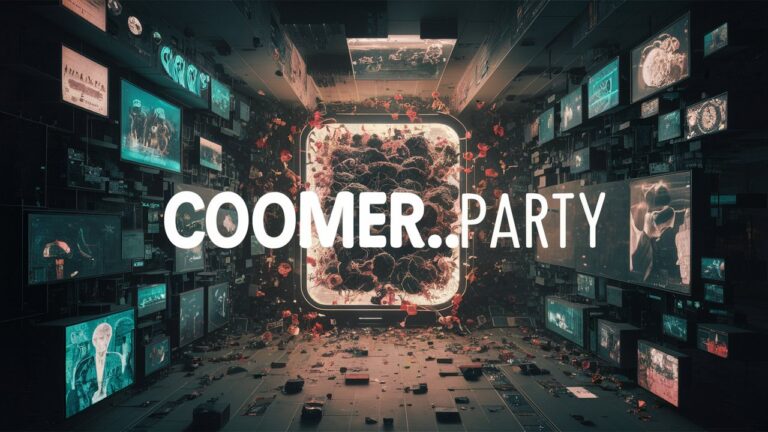Introduction: The Enigma of Coomer.Party
The internet is a vast ecosystem of communities, subcultures, and platforms, each with its own niche audience. Among these, Coomer.Party has emerged as a controversial yet intriguing phenomenon. Often associated with memes, adult content, and internet subcultures, the platform has sparked debates about digital ethics, privacy, and the boundaries of online expression. This article explores the origins, cultural relevance, and ethical dilemmas surrounding Coomer.Party, while addressing frequently asked questions to demystify its role in modern internet culture.
What Is Coomer.Party? Defining the Platform
Coomer.Party is a website that gained notoriety for aggregating and hosting adult content, often sourced from social media platforms like Twitter, Reddit, and OnlyFans. The term “Coomer” itself originates from internet slang, mocking individuals perceived as overly obsessed with adult content. The platform’s “.party” domain suggests a communal space, but its primary function revolves around sharing explicit material, often without the consent of content creators.
The site’s structure resembles a forum, where users can browse, upload, or request content. However, its lack of content moderation and ethical safeguards has drawn criticism. Unlike mainstream platforms, Coomer.Party operates in a legal gray area, raising questions about intellectual property rights and digital consent.
The Cultural Impact of Coomer.Party
Coomer.Party reflects broader trends in internet culture, particularly the tension between anonymity and accountability. The platform thrives on the “free culture” movement, where users believe content should be accessible without restrictions. However, this ethos clashes with creators’ rights to control their work and monetize their labor.
The site has also become a focal point for discussions about parasocial relationships. Fans who feel entitled to creators’ private content often use platforms like Coomer.Party to bypass paywalls, undermining the financial sustainability of content creation. This dynamic highlights a growing divide between consumers and creators in the digital age.
Controversies Surrounding Coomer.Party
The platform’s controversies are multifaceted. First and foremost is the issue of non-consensual content sharing. Many creators have reported their exclusive content being leaked on Coomer.Party without permission, leading to emotional distress and financial loss. This raises legal questions about copyright infringement and the responsibility of hosting platforms.
Another controversy involves cybersecurity risks. Users of the site may unknowingly expose themselves to malware, phishing schemes, or data breaches due to lax security protocols. Additionally, the platform’s anonymity features enable harassment and doxxing, further endangering both creators and consumers.
Legal and Ethical Concerns
Legally, Coomer.Party operates in murky territory. While Section 230 of the U.S. Communications Decency Act protects platforms from liability for user-generated content, courts are increasingly scrutinizing sites that knowingly host illegal material. Creators have begun filing DMCA takedown notices, but the site’s decentralized structure complicates enforcement.
Ethically, the platform challenges notions of digital consent. By normalizing the unauthorized distribution of content, Coomer.Party perpetuates a culture of exploitation. This not only harms creators but also desensitizes users to the human impact of their online actions.

Community Responses and Activism
In response to Coomer.Party, online communities have mobilized to protect creators. Campaigns like #NoCoomer and #SupportCreators advocate for ethical content consumption, urging users to respect paywalls and report unauthorized leaks. Social media platforms have also stepped up moderation, banning links to the site and suspending accounts that promote it.
However, the platform’s user base argues that it serves as an archive for content that might otherwise be lost. This debate mirrors larger conversations about digital preservation versus privacy rights, with no clear resolution in sight.
Alternatives to Coomer.Party: Ethical Content Consumption
For those seeking adult content without ethical compromises, several alternatives exist. Platforms like OnlyFans, Patreon, and Fansly allow creators to monetize their work directly, ensuring fair compensation. Meanwhile, communities on Reddit and Twitter promote consensual content sharing, often with strict moderation policies.
Educating users about digital consent is equally critical. Initiatives like cybersecurity workshops and creator-led Q&A sessions help bridge the gap between consumers and creators, fostering a more respectful online ecosystem.
Conclusion: Navigating the Complex Legacy of Coomer.Party
Coomer.Party is more than a website—it’s a microcosm of the internet’s darkest and most complex dynamics. While it highlights the demand for unrestricted access to content, it also underscores the urgent need for ethical frameworks in digital spaces. As users, creators, and lawmakers grapple with these issues, the platform serves as a cautionary tale about the consequences of unchecked online behavior. Moving forward, balancing freedom with responsibility will be key to building a safer, more equitable internet.
Frequently Asked Questions (FAQs)
1. Is Coomer.Party legal?
While the site itself isn’t illegal, hosting or sharing copyrighted content without permission violates intellectual property laws. Users accessing or distributing such material may face legal consequences.
2. How can creators protect their content from being leaked?
Creators can use watermarks, DMCA protection services, and legal takedown notices. Platforms like OnlyFans also offer advanced security features to deter leaks.
3. Are there risks to visiting Coomer.Party?
Yes. The site lacks robust cybersecurity measures, potentially exposing visitors to malware or data theft. Users should exercise caution and avoid sharing personal information.
4. Why does Coomer.Party exist if it’s controversial?
The platform capitalizes on the demand for free adult content and exploits gaps in content moderation. Its existence reflects broader systemic issues in internet governance.
5. What should I do if my content appears on Coomer.Party?
File a DMCA takedown request immediately. Consult a legal professional to explore further action, and report the incident to your hosting platform for support.
This comprehensive exploration of Coomer.Party aims to inform readers about its implications while encouraging mindful engagement with digital content.
